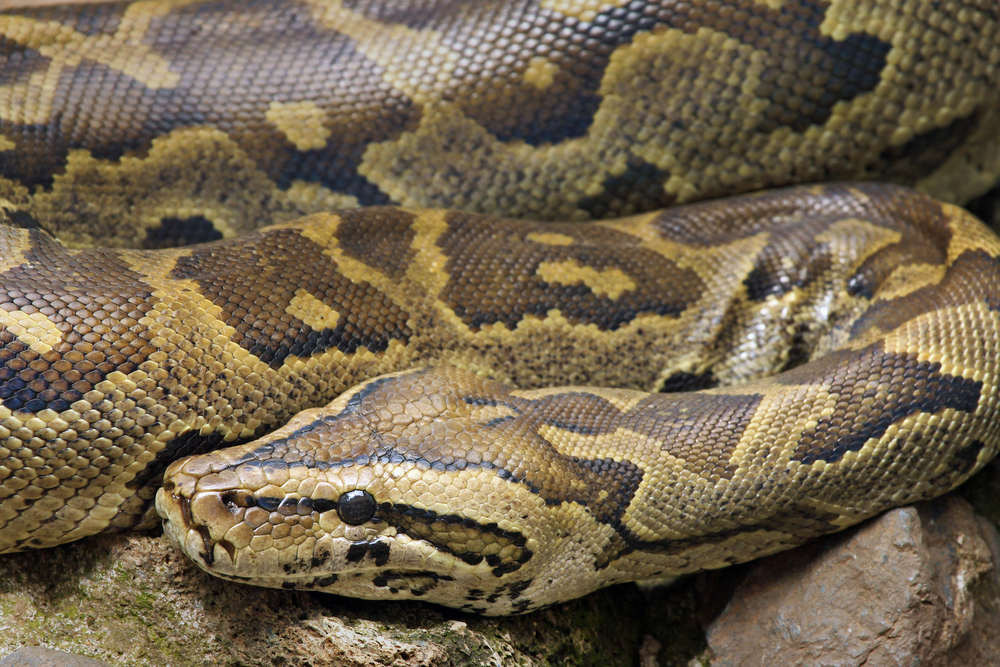Killer Python Highlights Dangers of Exotic Pets

Two young brothers, ages 5 and 7, were killed by a python that escaped from a pet store, slithered along ventilation ducts and dropped through the ceiling of the room where the boys were sleeping.
The snake — a 100-lb. (45 kilograms) African rock python — was kept in a pet store located on the first floor of a building in Campbellton, New Brunswick, Canada. The brothers, Noah and Connor Barthe, were visiting the building for a sleepover one story above.
"I can't believe this is real," said pet-store owner Jean-Claude Savoie, as quoted in USA Today. The boys were the children of Savoie's best friend, and they often visited his son. [Image Gallery: Snakes of the World]
Police are treating the deaths as a criminal investigation, and autopsies for the two boys are scheduled for today (Aug. 6).
Though snake expert John Kendrick, manager of the Reptile Store in Hamilton, Ontario, told the Associated Press that the strangling deaths were "very unusual," they highlight the risks associated with keeping exotic pets.
Born Free USA, an advocacy group that seeks to end the ownership of wild animals, has documented some 1,500 animal attacks — including 75 that resulted in human deaths — as well as escapes and other incidents involving exotic animals since 1990.
In 2011 alone, a 4-year-old boy in Texas was severely injured by a pet mountain lion kept by his aunt, an 80-year-old man in Ohio was attacked by a 200-lb. (91 kg) kangaroo and a Nebraska man in his 30s died after being strangled by his pet boa constrictor.
Sign up for the Live Science daily newsletter now
Get the world’s most fascinating discoveries delivered straight to your inbox.
The patchwork of state and territorial laws governing the ownership of wild and exotic animals has resulted in some places, like Ohio, becoming havens for exotic-animal owners.
These discrepancies were brought to light in 2011, when Terry Thompson of Zanesville, Ohio, released his entire menagerie of lions, tigers, bears, monkeys and other animals from their cages before committing suicide. Authorities were forced to shoot and kill nearly 50 of the animals before they caused any injuries or deaths, and Ohio now has stricter exotic-animal regulations.
In addition to the risk of death or injuries, there's also a chance the exotic animals could transmit deadly infections to humans.
"It's not just about bites, scratches or mauling," Adam Roberts, executive vice president at Born Free USA, told LiveScience. "It's also about disease." Reptiles can carry the bacteria Salmonella, and monkeys can carry the herpes B virus, both of which can be fatal to humans.
The 14-foot-long (4.3 meters) python responsible for the deaths of the two Canadian boys was destroyed by a local veterinarian. Kendrick said that the snake, after falling from a ceiling vent, was likely scared and wrapped itself around the sleeping boys.
"Once they are in constricting mode, any part of their body that is touching something that moves, they'll wrap it," Kendrick said. "I've seen snakes with two different prey items at the same time — one with the back of the [snake's] body and one with the front. It could have been an incident like that."
Follow Marc Lallanilla on Twitter and Google+. Follow us @livescience, Facebook & Google+. Original article on LiveScience.com.










